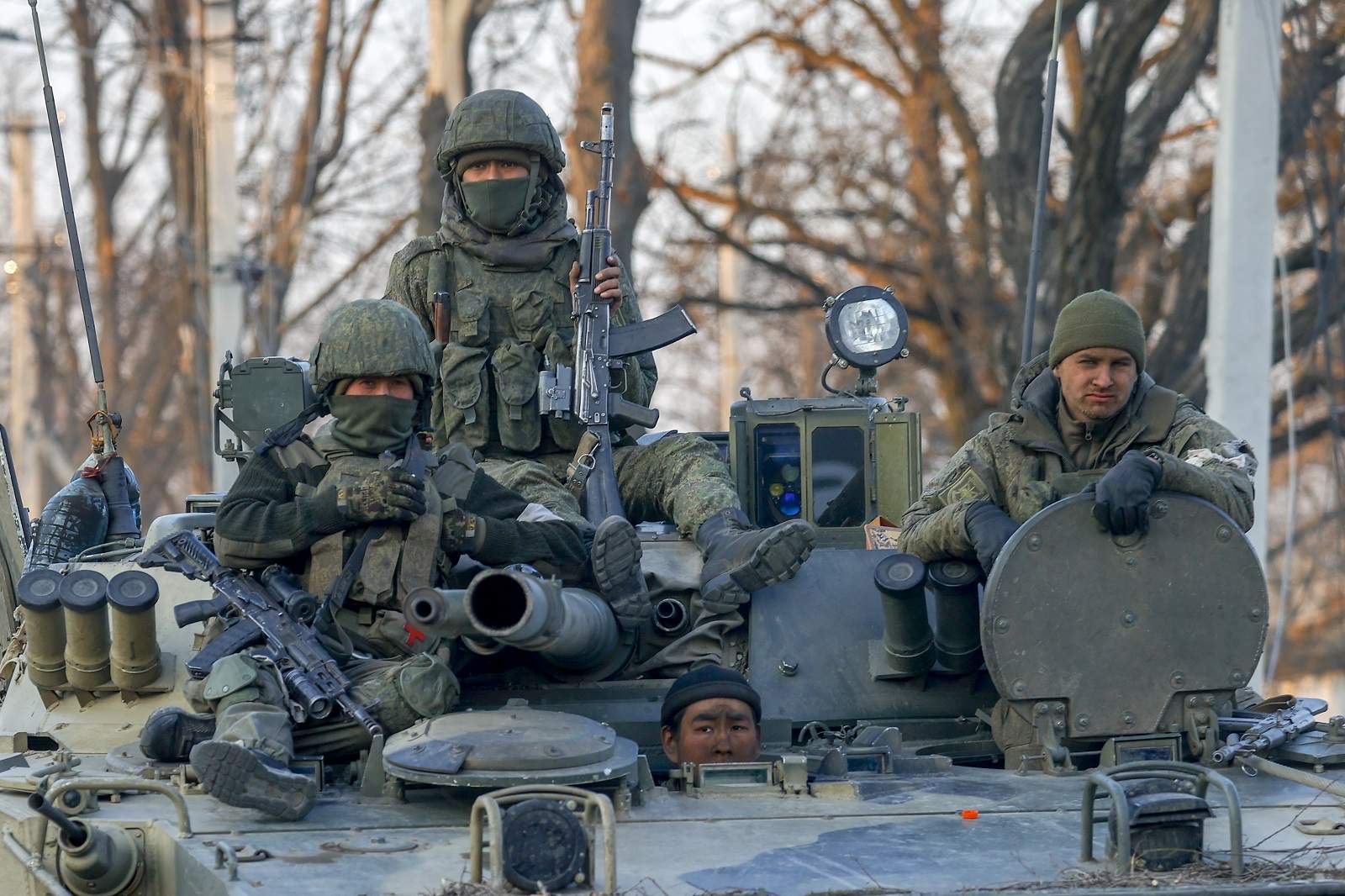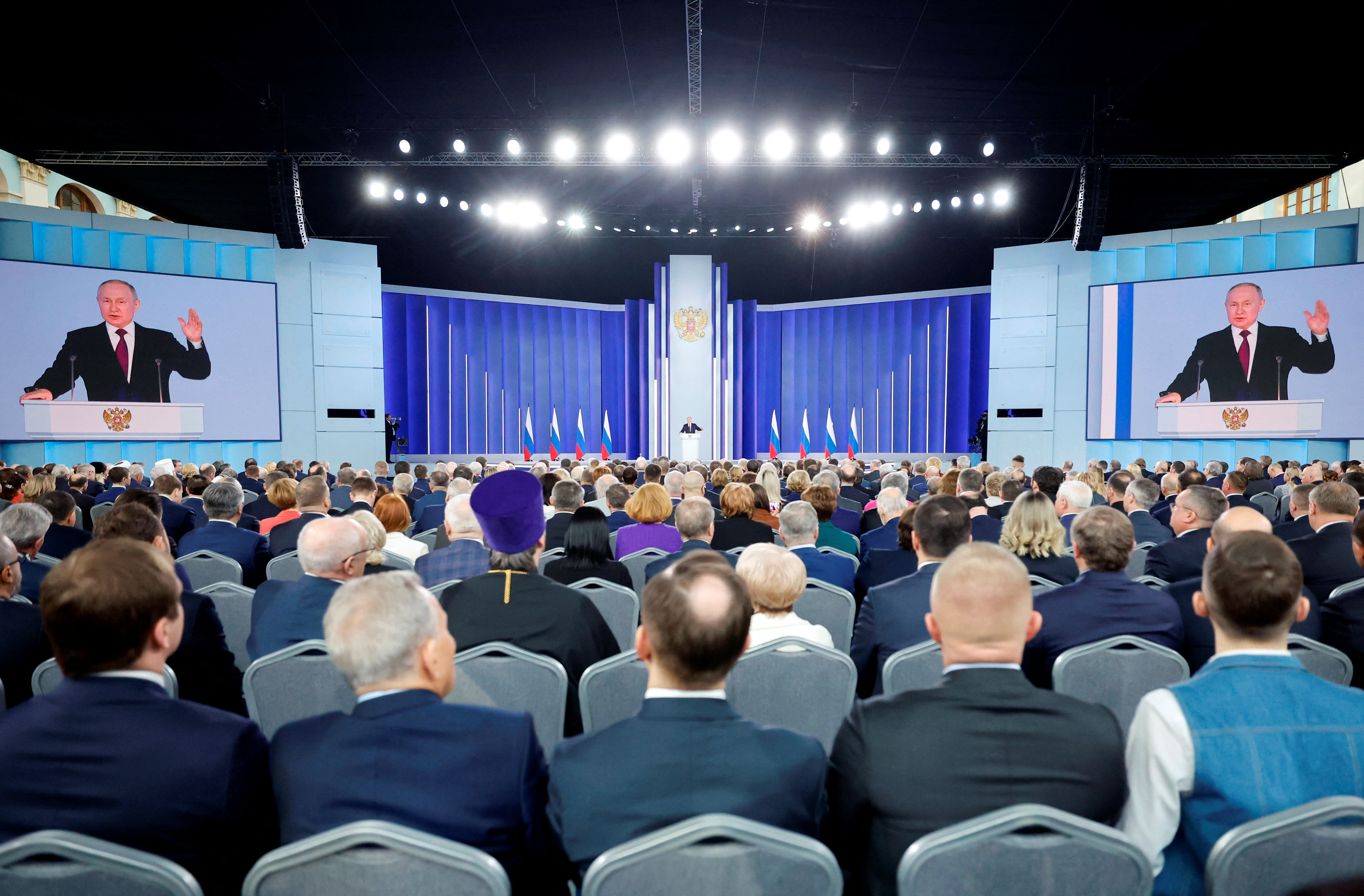Few celebrated, many absconded Vladimir Putin’s sworn-in ceremony. He walked on stage to deliver his fifth inaugural keynote, bolstering Russia’s future agenda that is both expensive and unsettled
His return to his office is no surprise. Considered a manufacturer of “hard” policies, Vladimir Putin was uncompetitively bestowed Presidency of Russian Federation earlier this year. He won the Presidential election with a thumping majority of 87%. What contributed to his landslide victory had little to do with his economic mandate but much to his “manipulative” branding. His well-oiled media machine didn’t leave single opportunity from advertising Putin, a staunch “nationalist” – a “savior” of Russia’s sovereignty. Russian artillery shelling bombs on Ukrainian territories remotely made any headlines.
But someday, those artilleries have to be replaced with a more powerful one, and the cost to meet the replacement will be rendered on Russian bourgeois’ taxpayers. The more a war infused Russia moves steadily on the battleground, the worse its economic state becomes. Putin, thereby, will be expected to channel some tough economic decisions throughout his next six-year incumbency – an agenda which bolsters Russia’s aggression against Ukraine without birthing domestic infractions.
Vladimir Putin takes his fifth presidential oath of office at the inauguration ceremony. pic.twitter.com/UqQT7SBAht
— Putin Direct (@PutinDirect) May 12, 2024
Here are the Top 5 agendas (sourced from his speeches, statements and as analyzed by political experts) that Russia’s President Vladimir Putin is going to pursue for his next 6-year tenure:
Agenda 1: Institute tax increase
Vladimir Putin’s tax mandate is stationary – institute a rare tax increase on corporations and high earners to cover expenses which are both defensively and economically motivated. Destruction of Russian properties subsequent to Ukraine’s retaliation has infused extra burden on Russian government who all this while underestimated Ukraine’s weaponry capabilities much of that it drives from Western allies.
The proposed agenda of tax increase underscores Mr. Putin’s rising confidence about his control on the Russian elite, and his country’s economic resilience despite heavy sanctions imposed by anti-Russian conglomerate. Russia’s oil industry which is one of the biggest in the world has proved to be a pillar of strength for its economy in times of geopolitical uncertainty. “Modernization of the fiscal system should ensure a more equitable distribution of the tax burden, while stimulating businesses that develop and invest”, Mr. Putin explained in a speech on Wednesday.
Russian officials have considered raising personal income tax for earnings over a million rubles ($10,860) a year from 15 percent to 13 percent, and increasing rate for earnings above five million rubles a year ($54,300) to 20 percent from 15 percent. Tax on corporate profits would be raised to 25 percent from 20 percent. The change in corporation and civilian taxation is an agenda considered one of the key ways to increase the revenue from sources other than oil and gas sector.

Agenda 2: Increase in military spendings
In a bill, Russian lawmakers backed a record increase in military spending to fund Moscow’s offensive on Ukraine. An offense which has been waging past two years had pushed Kremlin to reinforce superiority in its military capabilities. Russian lawmakers built an agenda to spend a third of the federal budget on defense department – up 68% to a record 10.8 trillion rubles ($115 billion).
The Russian economy has been increasingly militarized throughout the 20-month offense. Russian Defense Minister, Sergei Shoigu, enlightened millions through his arms dictate about how Russia uses 15,000 tons of materials – including ammunition and fuel – everyday to bolster its offenses on Ukraine.
At more than 6% of the country’s GDP, military spending will hit its highest share of the economy since the collapse of the Soviet Union. Overall government spending will rise more than 20%.The increased military spending reflects Mr. Putin’s everlasting determination to keep war against Ukraine alive, unhindered, and moving, till it eventually accomplishes what it has been aiming for all this while.

Agenda 3: Aggresive Foreign policy can see rays of cooperation and tolerance
The malicious war which Western countries contemplates is all accredited to Putin’s lust for authoritarianism has led to astonishing crisis globally – Broken supply-chains, alarming humanitarian causalities, and thousands left impoverished. Furthering Moscow’s infiltration of Ukraine and West’s unapologetic support for the latter has only worsened any chance of cooperation between the two.
Since the dawn of Russia’s aggression, United States and European Union have stood headstrong with Ukraine, to an extent of disconcerting Mr. Putin. Sanctions lashed on Moscow by its longtime nemesis in consequence to its forceful breach of International law had derailed Russia from its economic prosperity. Reckoning no cooperation in-sight between the two ideologically conflicting states, Mr. Putin in his inaugural address made a statement shocking enough to make headlines.
Mr. Putin mentioned his agenda for cooperation with the West. Though his vision to subjugate Ukrainian territories and bring them under his umbrella remained rooted, he left the choice for dialogue on the West – to either contain Russia and continue the policy of aggression, or start looking for a path to peace and cooperation. “Dialogue, including on security and strategic stability, is possible, but not from a position of force, but only on equal terms and with due respect for each other’s interests”, Putin added during his inaugration speech.
The Russian authorities have made it clear that they are only prepared to enter into a strategic dialogue with Washington on an “inclusive” basis – if ever Washington agree to the partition of Ukraine, which is unrealistic in current circumstances, only then will Kremlin extend a hand of diplomatic dialogue.

Agenda 4: Combating economic volatility
After Russia invaded Ukraine in 2022, Western nations imposed extensive sanctions and trade restrictions to curtail Moscow from slashing billions of dollars on the war. As what one may applaud, was an agenda which Russia fostered to remain immune from economic derailment – it found new providers for drones, surveillance gear, and computer chips. It is not to say that sanctions did not take toll. They raised the cost of many items for Russian civilians, devaluing ruble’s value and stoking inflation at home.
Despite the lingering economic uncertainty, Russia proved to be surprisingly adaptable, thanks partly to its relationship with China. Trade between China and Russia hit a record high last year, as Russians turned to Chinese cars, electronics and weapon components. Moscow established a personal network of oil traders after sanctions restricted it from exporting oil – its most essential commodity to its key Western allies. New channels of Russian oil were expanded based in countries like China, India, United Arab Emirates, and few European nations.
Russia has customized an agenda which makes it better integrated into the world trade. It exports essential commodities to other countries like Cuba, Venezuela, and Iran, such as steel and fertilizer. If West chose to go full-out in putting sanctions on Russia then it will disrupt the global economy. Pain aimed at Russia will be felt well beyond its borders, which is why Russia, despite worldly curtailments was able to rise from the ashes, combating economic volatilities and cooling inflationary pressures.

Agenda 5: “Annex Ukraine”!
It is no surprise what Russia desires the most. If anything, it has overtly presented its determination and unshakable spirit to achieving it, or more so, “annexing” it. Mr. Putin’s speech on February 29, to both chambers of the Russian parliament intensified his agenda which he conveyed matters to him the most: The war in Ukraine. He pulled out all his strings to convey his rhetoric with pride and confidence – an attitude which is manifold different than last year, when his speech was peppered with emotional outbursts, and notes of bitterness, agitation, and resentment.
Two months into his renewed Presidentship and two years into the war, his motivation to solidify Russian statehood in Ukraine is more than ever – confrontational. His agenda to annex its Eastern counterpart is at top of the executive ladder and he shows no interest in coming back down, ever. The seated parliamentarians who watched Mr. Putin clouding on an air of anger, reciprocated with timely applauses, huge shout-outs and anguish grin.
Every routine decision which Kremlin takes since the war broke out is only concentrated on its military development – resources to defend itself from Ukraine’s retaliation, hoarding heavy machineries to attack twice as aggressively, special provisions to meet unforeseen circumstances, and filling crematoriums with soldiers around whom surrounds a country flag for their “unwavering” sacrifices.
Mr. Putin has routinely outlined his annexation a “holy war” spiritually motivated for the betterment of mankind. And to help him achieve was he has outlined, people of Russia have donated their decisive votes in huge numbers, reinstating Mr. Putin’s presidential credibility and giving a sense of renewed motivation to his aggression against Ukraine.













Comments 1